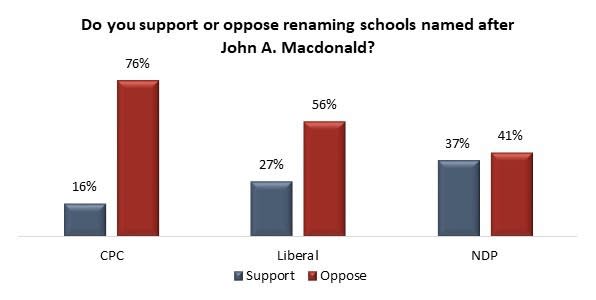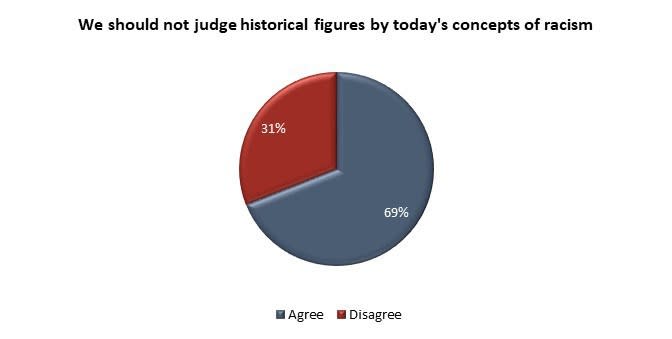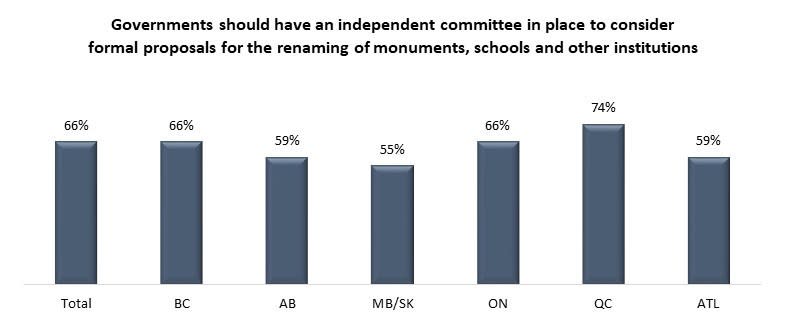Most Canadians oppose dropping John A. Macdonald's name from schools, poll suggests

More than half of Canadians are against changing the names of schools that pay tribute to the country’s first prime minister, according to a new poll.
The Angus Reid Institute released its findings Monday following a nationwide debate on the historic legacy of one of Canada’s founding fathers, Sir John A. Macdonald. The pollster’s numbers suggest that 55 per cent of Canadians oppose the move to drop the name while 25 per cent were in favour and another 19 per cent didn’t offer an opinion.
However, the polling shows that Canadians from all parties variously opposed the move.
The discussion was sparked following a vote by the Elementary Teachers’ Federation of Ontario calling for the removal of Macdonald’s name from public schools due to his support for forcibly assimilating Indigenous people. The former prime minister referred to Indigenous people as “savages” as he made the case for residential schools in Canada.

The highest level of opposition to removing Macdonald’s name came from people who had voted for the Conservatives in the last federal election, with 76 per cent of respondents saying they opposed the move, while only 16 per cent supported it. But Liberal voters weren’t far behind; 56 per cent of respondents opposed the removal and 27 per cent were in support of it. NDP voters were almost evenly split, with 41 per cent opposed to renaming schools and 37 per cent in favour of it.

Poll respondents also showed a degree of pragmatism in how they judged historic figures. While by today’s standards, someone like Macdonald would be considered a racist, others may say he was a product of his time. Macdonald was born in 1815 and died in 1891, more than 125 years ago.
In the survey, 69 per cent of respondents felt that society should not judge historical figures by today’s values system, which mostly denounces racism and prejudice of any kind. The other 31 per cent of those surveyed felt that society should be able to judge men who lived a century ago by contemporary values.

But Canadians showed they were also open to discussing the future fate of schools, statues and monuments dedicated to potentially controversial figures. Halifax’s mayor has said that he would form an independent committee to determine how the city continues to associate with Edward Cornwallis, who served as the British governor of Nova Scotia from 1749 to 1752 and infamously offering a bounty for the scalps of Mi’kmaq males. While Cornwallis is the founder of Halifax, he is also accused of committing genocide against Indigenous people for his permissiveness of cruel treatment towards them.
When asked, 66 per cent of Canadians said they would like to see an independent committee be set up to consider requests to rename schools and monuments dedicated to controversial historical figures, with the highest levels of support coming from British Columbia, Ontario and Quebec.

A majority of poll respondents also offered more nuanced views on the issue of historic commemoration. When remembering historic figures, 88 per cent of Canadians surveyed said the entirety of a person’s life and their principle legacy should be taken into account when commemorating them.
Nevertheless, opponents of naming or dedicating monuments to people such as MacDonald or Cornwallis contend that the scale of the abuses of the residential school system and the legacy of colonialism continue to cause enduring pain for Canada’s Indigenous people.
The online survey was conducted by the Angus Reid Institute from August 25 to 27 among a representative randomized sample of 1,512 Canadian adults. The results have a margin of error of +/- 2.5 percentage points, 19 times out of 20 for a sample of that size.



